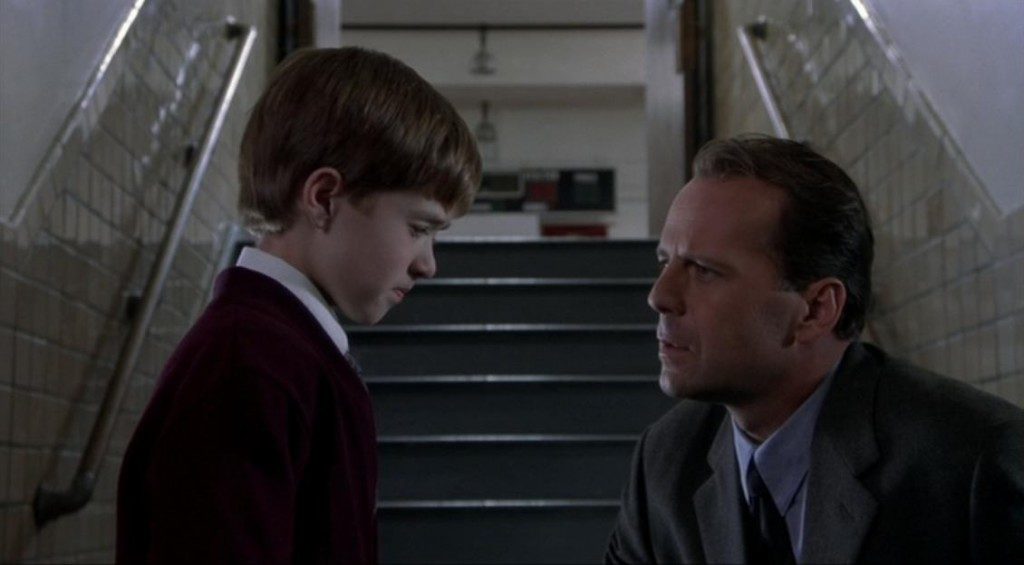
One night, heralded child psychologist Malcolm Crowe and his wife, Anna, find an intruder in their bathroom. It’s Vincent Gray, a former patient of Crowe’s who, still struggling to silence his demons, takes it out on his doctor before committing suicide. A year later, a rebounding Crowe discovers Cole, a young boy tormented by unexplainable visions who exhibits symptoms similar to those suffered as a child by Gray. This offers Crowe a shot at redemption. He believes that helping Cole will somehow make things right again and wipe away the guilt he feels about Gray’s suicide. Upon gaining the boy’s trust, Crowe learns that this extremely sensitive, compassionate 8-year-old has a sixth sense—the ability to see dead people walking amongst the living. But is this a gift or a curse? It’s up to Crowe (whose marriage seems to be unraveling) to help Cole (deemed a freak by his peers) demystify this supernatural skill.
Positive Elements: The principle characters are noble and easy to root for. Warmth, love and loyalty are shared by Crowe and Anna, Cole and his mother, and Crowe and Cole. Though misleading in its treatment of life after death, the film suggests that dead people wish to send messages of hope, truth and encouragement to their loved ones. Convinced that his distant wife is on the brink of an affair, Crowe tells Cole, “I haven’t paid enough attention to my family. Bad things happen when you do that.”
Spiritual Content: Cole seeks comfort in a Catholic church and collects small statues of saints. His exasperated mother tells him, “I’ve been praying, but I must not be praying right. I guess we’ll just have to answer each other’s prayers.” Cole channels the Latin translation of “Out of the depths I cry to you, o’ Lord.” For all of its talk of death, the film says nothing of heaven, hell or any involvement by a higher power. There is a lot of paranormal activity (“lost” objects simply being moved, cabinets and drawers opening mysteriously) explained as dead people intervening in the affairs of the living. The whole issue of interacting with the dead should give Christians pause, though there’s no spell-casting or summoning of spirits. Dead people with unfinished business simply take advantage of Cole to communicate with the world they’ve departed.
Crude or Profane Language: Several crude expressions, profanities and inappropriate uses of God’s name. When Crowe says “bulls—,” Cole scolds him, leading the doctor to apologize.
Sexual Conduct: Crowe and Anna prepare for an evening of passion, but are interrupted before removing too many clothes. Anna is shown nude through a smoky glass shower door.
Violence Content: Gray shoots Crowe before putting the gun to his own head and then (offscreen) pulling the trigger. That’s it, though numerous dead people carry the scars of the violence that took their lives: a family hanging from nooses; a battered woman with slashed wrists; a boy with a massive head wound caused by a gunshot; a cyclist who’d been hit by a car; a burn victim; and a vomiting girl who suffered a terminal disease. Cruel boys pick on Cole, at one point locking him in a dark, eerie closet which causes him to black out.
Drugs/Alcohol: Crowe and Anna celebrate with wine (she playfully accuses him of being drunk). Later, Anna must rely on antidepressants.
Other Negative Elements: A loss of self-control in the classroom inspires the typically kind, compliant Cole to lash out at his teacher and classmates for staring at him. Cole is shown standing in front of a toilet, urinating. The boy adds to his icon collection by swiping them from a local church. As a conduit for distressed souls, Cole has scribbled down pages full of profane, hateful venting.
Summary:“Do you ever feel the prickly things on the back of your neck?,” Cole asks Crowe. The doctor may or may not relate, but anyone watching this chilling psychological thriller will know exactly what he’s talking about. Spooky stuff. And millions of moviegoers have been eager to share the experience. The Sixth Sense edged out another creepy tale, The Blair Witch Project, to earn top box-office honors opening weekend, and should continue to draw sizable crowds on the strength of critical acclaim and positive word-of-mouth. But negative elements—spiritual counterfeits and the gruesome residue of violent death—give this movie an oppressive X-Files vibe. According to writer/director M. Night Shyamalan, “It’s reality-based fright. It comes from the fears of real people, real children and real adults; fears of loss, the unknown, of having a sixth sense about what lies beyond and fears of not understanding those intuitions.” Fortunately, Christians needn’t rely on intuitions or succumb to fears. And God’s promises in the Bible provide necessary, hope-filled understanding of what lies beyond—something The Sixth Sense sorely lacks.